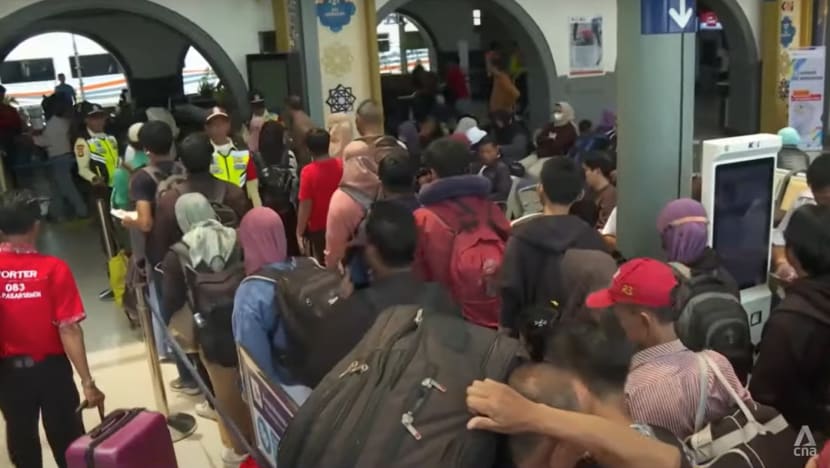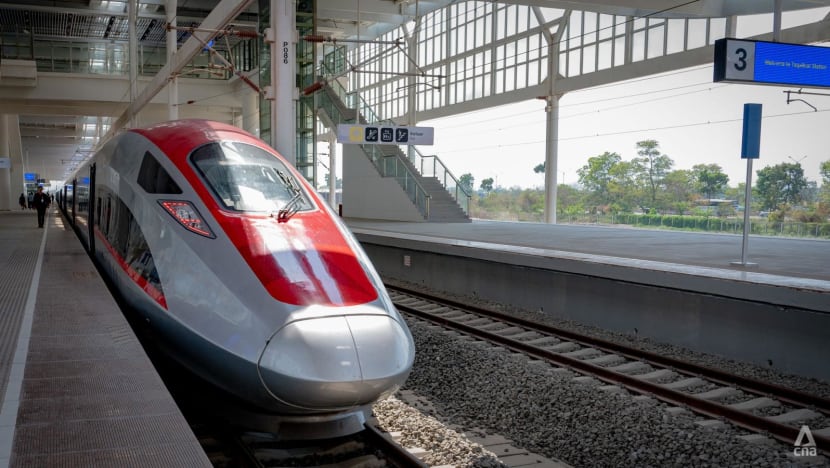Over 193 million Indonesians set to travel home for Eid, with new option of high-speed train
Many will be taking the Jakarta-Bandung high-speed rail, known as Whoosh, for the first time to see their extended families.

Travellers in Jakarta making their way home in the annual Eid mass exodus, locally known as “mudik” season, in April 2024.

This audio is generated by an AI tool.
JAKARTA: While the Eid mass exodus in Indonesia is an annual affair, Indonesians this year have a new travel option that can significantly cut down on travel times: the Jakarta-Bandung high-speed rail.
More than 193 million people – or 70 per cent of Indonesia’s population – are expected to be heading home, an increase of more than 55 per cent from last year.
For many Indonesians, Eid is the only time they see their families. Many will also be using the high-speed train, known as Whoosh, for the first time to travel home.
Indonesian officials said the maximum capacity for the festive period is about 300,000, with a Transportation Policy Agency survey estimating that more than 1.4 million travellers want to use the train during that period.
Whoosh, which began running in October last year, covers about 142km in a maximum time of 46 minutes.
The government also has plans to extend Whoosh to Surabaya, Indonesia's second-largest city. The Jakarta-Surabaya route, spanning 780km, will cut travel time from 10 hours by car and regular train to just three-and-a-half hours.
Ms Dini Rahmadani, a Jakarta resident, told CNA that she will be making her maiden Whoosh trip to Bandung, her home city and Indonesia’s third-largest city.
"Usually we travel by car, but because we have Whoosh high-speed train now and to avoid the traffic jams, I am going to take Whoosh,” she said.
“Last year, it took us eight hours to get there. Traffic was heavy, and we were tired from being on the road.”
The mass exodus, locally known as “mudik” season, is one of the country’s long-standing traditions, where millions return to their hometown to celebrate Eid and reunite with their extended families.

MOST FAVOUR TRAINS
Indonesians travel by road, rail, sea and air, but the most popular mode of transport remains trains. A transport ministry survey showed that more than 20 per cent of travellers favour it.
Kereta Cepat Indonesia China (KCIC), the high-speed rail network operator, has added more trips during the Eid period and is also familiarising many first-time passengers like Ms Dini with the various boarding processes.
Mr Emir Monti, corporate communications manager at KCIC, said commuters must get used to a different ticketing system which requires a card to be inserted at the gate. They then wait about two to three minutes in the queue.
“This is certainly different from other public transportation services. We also continue to familiarise people with our baggage and security rules.”
Separately, in terms of inter-city trains, the authorities have also added 344 trips from two stations in Central Jakarta to accommodate demand during the holiday period.
MORE EXPENSIVE BUS TICKETS
Meanwhile, bus ticket prices have risen up to 35 per cent depending on the destination.
The Siliwangi Antar Nusa Transport Company has increased their ticket price from East Jakarta to Pekanbaru in Riau province by 12 per cent, but this has not deterred travellers. A company driver said it is just as crowded as last year.
Indonesian authorities have said they are committed to implementing effective policies to prevent congestion in transport hubs and on the roads to ensure travellers have a safe and smooth journey home.

















